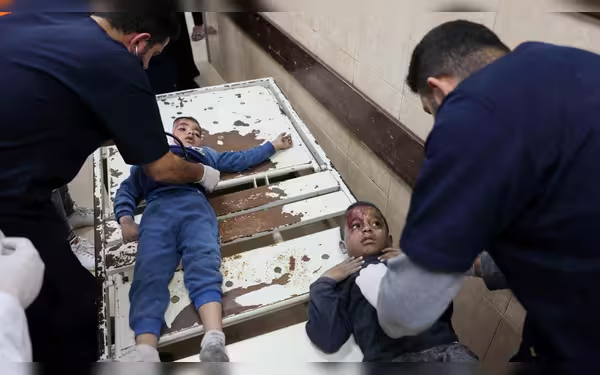Sunday, November 24, 2024 05:48 AM
Gaza Hospital Faces Extreme Catastrophe Amid Ongoing Conflict
- WHO raises alarm over dire hospital conditions in Gaza.
- Kamal Adwan Hospital director describes situation as extreme catastrophe.
- Israeli forces obstruct vital medical aid and resources.
 Image Credits: arabnewspk
Image Credits: arabnewspkThe humanitarian crisis in Gaza escalates as hospitals face extreme shortages of medical supplies and personnel amid ongoing conflict.
In the ongoing conflict in Gaza, the humanitarian crisis has reached alarming levels, particularly in the northern regions. The World Health Organization (WHO) has raised serious concerns regarding the dire conditions faced by hospitals still functioning amidst the chaos. One hospital director has described the situation as an "extreme catastrophe," highlighting the urgent need for medical supplies and personnel.
Margaret Harris, a spokeswoman for the WHO, expressed her deep worries during a press briefing in Geneva. She stated, "We are very, very concerned, and it’s getting harder and harder to get the aid in. It’s getting harder and harder to get the specialist personnel in at a time when there is greater and greater need." This statement underscores the increasing difficulty in delivering essential aid to those in need.
Particularly alarming is the situation at Kamal Adwan Hospital in Beit Lahia, which has been at the center of Israeli military operations against Hamas and other militant groups. Hossam Abu Safiyeh, the hospital director, conveyed the gravity of the situation, saying, "The situation in northern Gaza is that of an extreme catastrophe. We’re beginning to lose patients because we lack medical supplies and personnel." His words paint a vivid picture of the challenges faced by healthcare providers in the region.
Abu Safiyeh further revealed that his hospital has been targeted multiple times by Israeli forces, with the most recent attack occurring on Monday. He noted, "A large number of children and elderly people continue to arrive suffering from malnutrition," emphasizing the toll the conflict is taking on the most vulnerable populations.
Accusations have been made against Israel for obstructing the entry of vital resources, including food, water, and medical staff. The WHO's Harris estimated that between November 8 and 16, four WHO missions aimed at delivering aid were denied access. She stated, "There’s a lack of food and drinking water, shortage of medical supplies. There’s really only enough for two weeks at the very best." This stark reality highlights the urgent need for international intervention and support.
In response to the crisis, the Israeli defense ministry's COGAT has claimed that humanitarian efforts in the medical field are ongoing. They reported that on Monday, "1,000 blood units were transferred" to Al-Sahaba hospital in Gaza City, which is outside the immediate conflict zone. However, the effectiveness of these efforts remains questionable given the severe restrictions on access to hospitals.
The United Nations humanitarian office, OCHA, has also reported that access to Kamal Adwan, Al Awda, and Indonesian hospitals is severely restricted, with critical shortages of medical supplies, fuel, and blood units. The situation is dire, and the need for immediate action is more pressing than ever.
As the conflict continues, the plight of those in northern Gaza serves as a stark reminder of the human cost of war. The international community must come together to address this humanitarian crisis, ensuring that aid reaches those who need it most. The resilience of healthcare workers and the suffering of patients highlight the urgent need for a peaceful resolution to the conflict, allowing for the restoration of essential services and the protection of innocent lives.













